Straight edge
![]()
This article is about the youth movement. For the eponymous song by the band Minor Threat, see Straight Edge (song).
Straight Edge [stɻeɪt ɛdʒ] (English roughly 'sober edge', literally 'straight edge'; also straightedge, less commonly str8 edge, abbreviated SE, SxE or sXe) refers to a counter or youth culture from the realm of hardcore punk. Its adherents are referred to as "straight edgers", occasionally just "edgers". The movement owes its name to the song Straight Edge by the band Minor Threat, in which singer Ian MacKaye sings about his drug-free life. Straight Edge is made up of the word straight and the US phrase to have an edge.
Essentially, the understanding of straight edge was shaped by musicians in the hardcore punk scene in the early 1980s in the United States, when a young generation of punks began to reject the drug use that was integral to their scene at the time. Central to the straight edger mindset is the renunciation of alcohol, tobacco, and other drugs, as well as frequently changing sexual partners. Some Straight Edgers also abstain from consuming caffeine and/or extend Straight Edge to include vegetarianism or veganism. The symbol of the movement is an "X" painted on the back of the hands of minors in Los Angeles bars. This marking was to ensure that they were not served alcohol. It was adapted by the straight edge scene to express their voluntary abstention from intoxicants.
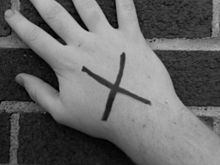
The "X" on the back of the hand as a symbol for Straight Edge
History
Origin
The straight edge scene was shaped in the early days by musician Ian MacKaye in particular. He formed the punk band The Teen Idles in 1979, which quickly gained popularity in the Washington scene. Ian MacKaye, the band's bassist and primary songwriter, was a fan of 1970s macho rocker and gun collector Ted Nugent, with whom he shared a drug-free lifestyle. MacKaye's songs bore titles like I Drink Milk and Deadhead and promoted a life that was straight, that is 'sober', 'pure' - as opposed to fucked up, that is a self-abusive lifestyle of glue, cocaine and heroin like that of the older punks on the Washington scene at the time.
After the breakup of Teen Idles, the two members MacKaye and Jeff Nelson formed Minor Threat, in which MacKaye was active as a singer. With this band he wanted to further propagate his idea of a drug-free life, which led to the creation of the song Straight Edge, which was included on the Minor Threat EP released in 1981. In this lyric, MacKaye describes his rejection of drugs and the self-destruction that comes with them. The refrain is I've got the straight edge (roughly: 'I'm straight edge' or 'I've got an edge because I'm sober').
This text took a big influence on the hardcore punk scene in a very short time. Many fans and punks adapted the idea. As a symbol they painted an "X" on their hands. The "X" marked minors in some pubs, to whom no alcohol was allowed to be served. The drug-free punks adopted this sign as a symbol for their lifestyle. In Washington, the variation "XXX" was also created as a reference to the three stars of the District of Columbia flag. The variation served, among other things, as the cover motif for the compilation Flex Your Head, which appeared in 1982 on MacKaye and Nelson's label Dischord Records.
The Three-Step-Formula ('Three-Step-Program'), elementary component of the Straight-Edge movement, goes back to the song Out of Step, which Minor Threat released on the single In My Eyes in 1981. The slogan was taken from the first lines of the song's lyrics.
"(I) Don't smokeDon't
drinkDon'
t fuck"
"(I) don't smokeDon't drinkDon
't
fuck"
- Minor Threat: Out of Step
Under the influence of Minor Threat, other straight edge bands such as 7 Seconds from Reno, SSD and DYS from Boston and Uniform Choice from California were formed, which were among the early representatives of the movement and made straight edge popular in other states as well. MacKaye himself never saw himself as a leader of the Straight Edge movement, but was proud that his attitude served as a role model for many young people. He understood his song lyrics as individual statements rather than a code of conduct. However, in further controversy within the Straight Edge movement, these statements were ignored by most followers. In these early years of the Straight Edge movement, no set rules yet existed that defined what ultimately constituted Straight Edge. Even the rejection of drugs was diffuse rather than dogmatic - despite the militancy with which it was sometimes advocated. Minor Threat and SSD, for example, were two of the most important early straight edge bands, although not all band members lived completely drug-free.
Expansion and stagnation (1981-1990)
In Boston, a vibrant straight edge scene developed with the Boston Crew around bands like SSD, DYS and Negative FX, but it had a reputation for being very violent. In the documentary Boston Beatdown, straight edge supporters were shown patrolling Boston's streets and beating up drug dealers. Bands like Slapshot, which later featured former Negative FX member Jack Kelly singing, were blamed for this violence. This was due to lyrics such as "Kill anyone with a beer in their hand". Kelly later said that these statements were more likely to be taken as self-mockery or a joke. The image of the Boston scene had some influence on the straight edge scene. Many young people who previously knew nothing about straight edge came into the scene because of the violent aspect. The Boston scene also had a great influence on the militancy of other scenes, especially those in New York City.
In the mid-1980s, the development of the hardcore and thus the straight edge scene stagnated. Many bands disbanded, such as Negative Approach, or changed musical style, for example SSD in the direction of metal. In Washington, violence at concerts led Minor Threat to feel increasingly uncomfortable at concerts. Other bands from closer to home followed MacKaye and his friends out of the straight edge scene, such as The Faith. They broke with the scene they helped create to create a less aggressive alternative with bands like Rites of Spring, Embrace, Gray Matter. This ushered in the beginning of emocore.
The resulting gap in the scene was filled by new bands, which in particular put their native New York on the straight edge map, and were counted as part of the genre New York Hardcore. A major influence was the band Youth of Today, which formed in 1985 and released one of the movement's most influential albums, Break Down the Walls in 1987. With bands like Warzone, Agnostic Front, Cro-Mags, and Murphy's Law, the band had allies who helped them gain a foothold in New York. These bands were not, or only partially, straight edge; Murphy's Law, for example, was known for its use of marijuana. It was the influence of these bands that made the Sunday Matinees at CBGBs possible. This concert series, which always took place on Sunday afternoons, had developed over the years into a meeting place for the hardcore punk scene. It was only through the support of the original hardcore scene that places were created there for straight edge bands to perform. This is how Youth of Today made sure that Straight Edge became widespread in the New York City area, and within a year the local scene was dominated by Straight Edge. Other straight edge bands from New York included Gorilla Biscuits, Bold, and Judge. These soon became known as the Youth Crew, named after a song on the first Youth of Today EP.
Straight Edge had come to contain a firmer definition among this new generation of bands and fans. The core of this definition consisted of a rejection of all drugs, sometimes expanded to include a renunciation of promiscuity or premarital sex, citing the lyrics of Out of Step. Vegetarianism also gained wider currency, including through Youth of Today, who promoted a meat-free diet in song lyrics and interviews.
The "New School" (1989-2000)
In the 1990s, the straight edge movement spread worldwide, with the largest scenes emerging in Europe (especially the Netherlands and Germany) and Oceania. Larger radical left and anarchist scenes emerged in Israel and Latin America, while isolated Christian-based straight edge bands were formed in South Africa.
In the United States, on the other hand, the situation in the early 1990s was again initially marked by signs of disintegration: After the "Youth Crew" dominated the straight edge scene until about 1989, many bands were again frustrated by the increasing violence at concerts and felt uncomfortable in the straight edge scene. A new, up-and-coming generation showed little interest in the original ideals of the punk and hardcore scene, according to many representatives such as John Porcelly of Youth of Today and Judge. In their view, an increasing standardization had occurred. The individuality they had originally sought had given way to a homogeneity that no longer differed from the original culture against which they had once rebelled. For this reason, some representatives left the scene, including Mike Ferraro of Judge and Walter Schreifels. After the development of straight edge largely stagnated in the years 1989 to 1991 as a result and numerous other bands disbanded, the scene differentiated itself in the 1990s. A new generation of bands emerged around 1994, dubbed "new-school hardcore." Major labels here were Victory Records and Revelation Records. Bands included Snapcase, Earth Crisis, and Unbroken, among others. In addition, various spin-offs of the original movement emerged:
Hardline
→ Main article: Hardline (subculture)
The Hardline movement was one of the dominant forms of straight edge in the 1990s. With the Hardline Manifesto, released on the Vegan Reich single Hardline in 1990, the movement found both its name and its definition. Hardline defined itself as the radical arm of the Straight Edge, actively fighting against anything it deemed unnatural. In addition to things rejected due to the principles of the Straight Edge, these include abortions, homosexuality, and any violence against animals. Hardline itself saw itself as a movement that was ready to use violence at any time to achieve its goals.
Sean Muttaqi of Vegan Reich was their mouthpiece. He spread his views through the fanzine Vanguard and his record label Hardline Records. Other representatives of the Hardline movement were Raid and Earth Crisis (in the early years). Also worth mentioning is the band One Life Crew from Cleveland, whose lyrics were militant and partly xenophobic.
Particularly in the US and the UK, Hardline found a larger number of supporters. Hardline's viewpoints were not shared by all Straight Edge supporters, but were at least initially tolerated. Over time, the number of true Hardliners decreased, mainly because many Straight Edgers did not want to be associated with the negative and violent image of Straight Edge known from the media. The influence of Hardline today is therefore to be considered small.
Krishnacore
Krishnacore emerged in the early 1990s, among others through the bands Shelter and 108 and the label Equal Vision Records. The music style tried to unite the ideals of Straight Edge with the religious foundations of the Krishna movement. It found many followers in the hardcore scene in the early 1990s. Krishna consciousness shares three key points with the Straight Edge scene: abstaining from meat, abstaining from sexuality, and abstaining from drugs. Krishnacore thus added a religious, spiritual component to the straight edge scene. A pure life and the renunciation of material goods also became important here. The movement was not limited to the straight edge scene, as bands like Cro-Mags and Integrity also adopted elements of the Krishna faith. However, Krishnacore never really caught on and the number of its followers remained numerically small.
Vegan Straight Edge
The vegan and vegetarian part of the scene was founded in the late 1980s. However, the term Vegan Straight Edge emerged in the 1990s and is mostly used as a music category. It was the "most significant current" within Straight Edge in the 1990s. Bands whose lyrics relate to this aspect of straight edge culture are counted as belonging to this trend. Like Hardline, the Vegan Straight Edge is often considered militant. Ideologically, it includes the "protection of innocent life", which is not limited to animal rights and animal welfare, but also rejects abortions. The sexual aspect also plays a role here, so a "strict monogamy" is expected by parts of the scene. One of the best known examples is the band Earth Crisis, which is considered one of the founding bands. In the Vegan Straight Edge scene, other fads were used, such as piercings, longer hair, and loose pants, which were less common in the rest of the Straight Edge scene. Musically, the Vegan Straight Edge opened up to metal and is therefore often considered a precursor to metalcore.
Further development
In addition, there was a whole series of bands that could not be assigned to any of these groups and redefined the musical style. Hardcore punk was joined by influences from the metal, grindcore and crust punk scenes. Another trend towards the end of the 1990s was the straight-edge bands often referred to as "posi-core", which took a more satirical approach, such as the D.C. band Good Clean Fun.
Since 2001
In the 2000s, some bands enjoyed commercial success for the first time in the history of the straight edge movement. For example, Strife, Throwdown, and Earth Crisis played Ozzfest, one of the largest touring festivals. The independent label Victory Records also had success with non-Straight Edge bands Hatebreed and H₂O. This opened Victory Records up to other styles of music, as did Revelation Records. Both now ceased to be pure straight edge labels. Other bands such as Eighteen Visions, Poison the Well and Killswitch Engage signed to major labels. Many bands loosened their relationship with the straight edge scene or left it altogether as their success grew. This was accompanied by a commercialization of the movement, which some followers view critically.
New directions in the underground were set by, among others, the so-called Queer Edge scene, which combined homosexual lifestyles with the Straight Edge, and that of the Grrrl Edge, which stemmed from the Riot Grrrl movement. Recent years have also seen a Youth Crew revival, with leading bands of the late 1980s such as Youth of Today, Gorilla Biscuits and Bold reuniting and touring.
.jpg)
"Youth Crew Revival": Youth of Today live 2010
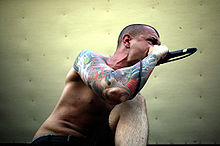
Throwdown (picture from 2007) was founded in 1999.
.jpg)
Ray Cappo is considered the founder of Krishnacore (2010 recording).
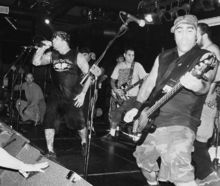
Agnostic Front (live 2007), one of the bands that helped the straight-edge scene gain a foothold in New York City
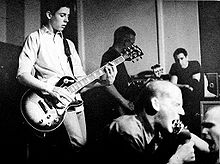
The band Minor Threat is considered the founder of the Straight Edge movement (picture from 1981)
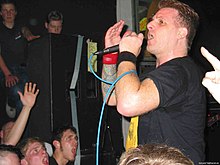
7 Seconds brought the straight edge scene to Nevada (picture from 2005 reunion).
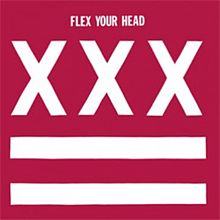
Variation of the flag of the District of Columbia, here as record cover
Basic Principles
The lyrics "Don't smoke / Don't drink / Don't fuck" from Minor Threat's Out of Step are still considered the cornerstone of Straight Edge ideology, but have been reinterpreted and expanded several times over the years. Three rules can be noted as basic constants that apply to most Straight Edge followers: Abstaining from alcohol, abstaining from other drugs, and abstaining from a promiscuous lifestyle. These points clearly distinguished Straight Edge from the punk and hardcore punk scenes of the time, as well as from other youth cultures. The use of drugs, especially alcohol, was one of the most common ways of rebellion at the time, especially for teenagers in high school. Deliberately abstaining from these forbidden (by age restriction) but commonly used forms was seen as an affront by many of their peers. This was also evident in the punk scene, where older punks in particular saw themselves attacked and their authenticity violated.
Drugs
A major controversy is taking place in the straight edge scene over the interpretation of the term drug. While in the beginning only alcohol, nicotine and all other kinds of intoxicants were meant, the term was extended by various followers to include caffeine as well. These strict definitions assume that there are many substances that have an effect on human consciousness. They would harm people or lead them into addiction. The rejection of alcohol, nicotine and illegal drugs usually remains the common denominator and is the most common form of Straight Edge.
Sexuality
The line Don't fuck in Out of Step caused some discussion and misunderstanding within the movement. In several interviews, MacKaye reiterated his justification that he had nothing against sex, that sex was a great thing, he just wanted to speak out against a mentality where quick sex was more important than respect for the other person. The line caused years of debate, spawning a number of interpretations that included monogamy, even in conjunction with (mostly Christian) marriage, and also not having sex at all. However, many straight-edgers also reject this point altogether and assume that sexuality has nothing at all to do with the original straight-edge idea.
Vegetarianism/Veganism
The restriction to a vegetarian or vegan diet and to animal rights in general came about through the influence of Youth of Today, who brought this idea into the scene in 1988 in the song No More.
"Meat eating, flesh eating, think about
itso callous to this crime we commitalways
stuffing our face with no sympathywhat
a selfish, hardened society soNo
Morejust
looking out for myselfwhen
the price paid is the life of something else,
No Morei
won't participate"
"Eating meat, eating meat, think about it.
countless is this crime committed by usall
we put in our mouths without compassionwhat
a selfish, hardened society we are, thereforeNever
again will
I
think
only of myselfif the
price is another lifeNever again will
I partake"
- Youth of Today: No More
This extension of the Straight Edge idea was not shared by all parts of the scene. Especially in the 1990s, however, a vegetarian or vegan diet was understood as a fundamental principle of the Straight Edge. In Europe in particular, this form of diet is widespread in the Straight Edge scene and is an integral part of Straight Edge among a majority of its adherents. From the followers of the Straight Edge movement a whole series of initiatives arose, which took the animal protection thought into account. In part, supporters were also involved in the new animal protection organization PETA or in the animal liberation movement Animal Liberation Front.
Questions and Answers
Q: What is straight edge?
A: Straight edge is a lifestyle that involves abstaining from drugs, tobacco, and alcohol.
Q: Do all followers of straight edge abstain from illegal or casual sex?
A: Some followers of straight edge also choose to abstain from illegal and casual sex.
Q: Does no drug use for straight edge followers include caffeine?
A: No drug use for some straight edge followers includes caffeine, which is considered a stimulant drug.
Q: Do all straight edge followers reject drugs, even for medical reasons?
A: Some followers of straight edge will accept drugs such as codeine or morphine for medical reasons.
Q: Why do some straight edge followers not use Ny-Quil or Day-Quil?
A: Some followers of straight edge will not use Ny-Quil or Day-Quil because they contain alcohol.
Q: Is straight edge associated with gang affiliation in some cities?
A: Yes, in some cities, straight edge has been associated with gang affiliation.
Q: What do advocates of straight edge compare it to?
A: Advocates of straight edge compare it to a way of life, such as being a vegetarian.
Search within the encyclopedia